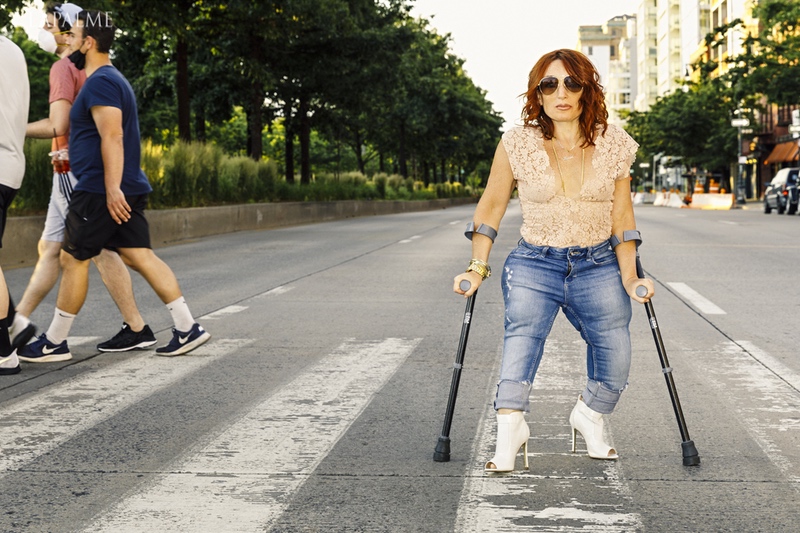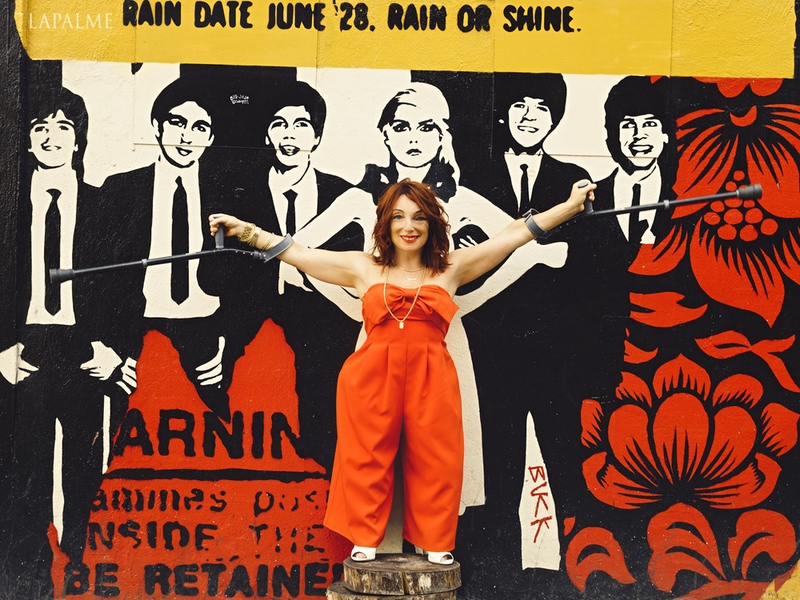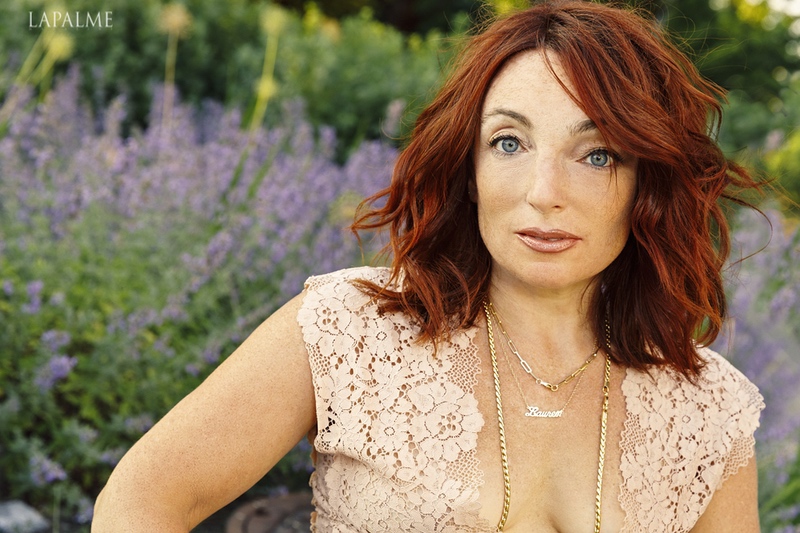
Lauren Ruotolo is an inspiration to us all! She is an accomplished author, speaker and a content marketing leader for many global brands. She was born with a rare genetic condition that affects the bones, causing her to walk with crutches. Lauren views her condition as a form of empowerment and uses it to lead an amazing life. She has since won multiple achievement awards in marketing and female empowerment, published her book “Unstoppable in Stilettos” and started her own shoe brand called Unstoppable Shoes. She sits down with Lapalme magazine to talk how she wants to inspire others to overcome their own challenges and start leading an amazing life, a life truly worth living.
Tell us about McCune Albright Syndrome. What are the typical indications, and how has it affected you? McCune-Albright syndrome a rare disease that affects the skeletal and endocrine systems, where my bones have abnormal scar-like (fibrous) connective tissue. This abnormal fibrous tissue weakens the bone, making it abnormally fragile and prone to fracture. Therefore, before the age of eleven, I broke my femur bone ten times and had one major surgery. The endocrine side of the disease gave me precocious puberty at the age of nine months off,. Therefore, due to the speed of growth within the body known as our sex hormone, I am on the short because I finished growing at the age of eight years old which is earlier than the average female. The average female grows to about 13-14 years of age.

How has McCune Albright Syndrome impacted your life? What has your journey been? Did you feel supported when you were younger? Do you feel supported now? As a woman born with this rare genetic disease, it’s hard to understand life without it. My disease, McCune Alrbights Syndrome, is part of who I am inside and especially out. From the outside, it’s all people see, but from the inside, it’s what helped shape my body and mind. My disease has given me the power at a very age to make life decisions of being empowered by my life challenges, and therefore, I never truly felt different from my friends until much later in life when I was no longer living my life in my parent’s house.
Today, I feel supported by myself, which is the most important person in my life. If I support myself, then I know I can get through anything. The world will ultimately never help disable people because we are different, and the world is terrified of people who are different from themselves.
Explain your “Unstoppable Mindset.” What triggered the adoption of this way of approaching life? What can you share with others who live with a disability to help them adopt your Unstoppable Mindset? It all started when I adopted my parent’s voice. Their voice was that of positivity and only having to deal with things as they rise.
I remember them saying, “Never think about it before it happens because it is added grief and unnecessary anxiety” Therefore, when I was challenged as an adolescent with brain surgery at the age of 12, I automatically became an advocate for myself by asking questions that were pertinent to me as a 12-year girl who only wanted to go her friend Bar and Bat Mitzvahs vs. concentrating on the how this surgery could affect her life by not going to parties. While this sounds like I was Diva, it was a mechanism that I used to help me get through challenging situations because I would also think towards the future and be excited about getting better and having something to look forward to vs. concentrating on being sick and giving myself anxiety. If the doctors told me I could make the party, I knew I could get through it all.
This mechanism of concentrating on something that I wanted to celebrate and or a moment in my life that I was looking forward to got me through everything and therefore I would say, deal with what is at hand with positivity vs. thinking about all the negative things that could happen because at the end of the day, we all want to go to the Bat Mitzvah, wedding, birthday party of even a fabulous dinner and if you set a goal to go you will no matter what surgery, treatment and situation you may be faced with at any point in your life.

In your book, you talk about “A Special Kind of Stupid.” Can you talk about what you mean by this and what’s encountered or had to deal with in this respect? When I speak of people being “ a special kind of stupid,” I don’t think they are stupid but don’t know how to talk and or act when talking to someone different than them, therefore either out of fear of not saying the right thing they say something so out of sorts that you question if there are all with it. For example, I live in NYC, and every day, people want to bless me and say, Wow, may g-d bless you or so, since your so short do you have to wear kid’s clothes, or my dog is afraid of your crutches.
All I have to say is that sometimes you should think before you speak and or think about what you’re about to say because you never want to be coined as a person who is “A Special Kind of Stupid”
What was the motivation for writing “Unstoppable In Stilettos?” What do you want people to learn? Did you always want to be an author? If I have to be honest, I never thought about writing a book until Joanna Coles, the Editor in Chief of Marie Claire and then Cosmopolitan, said, “ People need to know you, Lauren,” Know ME?? Why I said? She said, because your a fabulous bossy bitch with a mindset that people would pay for.
Therefore, I thought further, put pen to paper, and said I’m going to do it, not for me but for others that can learn from what I went through in life. I wanted to teach people the lessons, I learned and how I affected change in my own life by never giving up on myself.
As an author I thought, if someone can read my words and change their outlook on life or take a risk on loving themselves, then I did my job.
As an adult in the professional world, do you experience a stigma around your disability? How does the corporate world handle disabled applicants and employees? I cannot say there is stigma as much as not even thinking about the disabled community for a job outside of the cafeteria and or mailroom. We are invisible when it comes to hiring within corporate America.
What is your vision for your work and your brand? Where can people find out more about you, buy your book, and engage with/hire you? My vision first and foremost is education and inclusion. Similar to how our teachers and parents used to tell us that everyone that
Mental health has recently become a significant new topic of conversation, especially in dealing with the COVID-19 pandemic. What has come up for you in the last year? How have you coped with the emotional duress? Do you have any tips to share with others of what has worked for you?
As a woman who had COVID in the early days of March 2020, I felt like I was diagnosed with the plague; no one wanted to be around me. And if they were, it was at least 6ft apart with an N95 mask on and wouldn’t even enter my apartment. It was a very lonely and frightening time for thousands of people affected by COVID at that time and me. Scientists and doctors were hitting the ground researching the virus, and the press was scaring everyone who turned on the news. For the first time in my life, I felt imprisoned and scared as I gasped for air on the bathroom floor. I was terrified that I may need to go to the hospital and lived with high anxiety because of it.
In the past year, I learned that once again, by being sick I must set my mind to something else other than the virus. Unlike the other times as a child, I was an ill adult with a job that mattered. I was given an opportunity of a lifetime and launched a live digital show for Johnson & Johnson about the pandemic. I poured all my energy into the show vs. the virus. Why you ask because I knew that if I didn’t think about what was happening, I could mentally feel okay and, therefore, I could conquer anything. By concentrating on something else, the virus became secondary. My job and what I envision for the show became my priority.

In the end, the show was a success, COVID-19 stayed in my body for nearly 10 weeks, the lonely feeling is slowing coming to and end and I know that because I conquered something else I can take on whatever is next.
Remember, my parents taught me to take it day by day, never look back and or forward more than 24hrs because if you go after things with a positive attitude your head will allow you to overcome whatever is in store for you.
What advice/recommendations can you offer parents and the community on how to behave/engage with disabled children to ensure they feel included and welcomed? It’s easy and let me break it down for you:
- Never call us “handicapped.” Always refer to us as “disabled.”
- Be Mindful of how you speak to others, and teach others to talk to all people, no matter what they look like on the outside.
- Give your child the opportunity to have a voice in their care, make them feel included in the decision making outside the doctor’s office.
Why Fashion? Can you share with us how you got into fashion, what it did for you, and what you might say to those who have not genuinely tapped into this aspect of self-expression? From the time I was a child, fashion was a way for me to fit in, have something in common with my friends, and provide another topic and connection to have when I was young. Once I became a teenager, it became a way of life–not different from when I was a younger child as my family was always fashionable. My parents owned a beauty salon, so fashion and beauty was a staple in my house. Good fashion and good hair made me feel good, made me stand out and most of all made it feel like everyone else.
I say dress up for yourself, put on your best shoes, express who you are, because you are in charge of not only how your look but how you feel inside and out.
- Newport Beach’s Hottest New Event Venue, Opened July 13. - July 23, 2024
- MINNOW AT THE CROWS NEST - July 2, 2024
- *NSYNC’s Chris Kirkpatrick and MTV’s Brian McFayden, Launch Season 2 of Hit Podcast, “Name Drop.” - June 22, 2024
